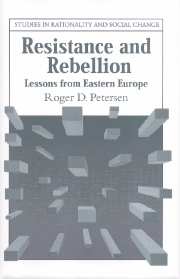Book contents
- Frontmatter
- Contents
- LIST OF FIGURES AND TABLES
- PREFACE
- 1 Introduction
- 2 Mechanisms and Process
- 3 Lithuania, 1940–1941
- 4 Rebellion in an Urban Community: The Role of Leadership and Centralization
- 5 The German Occupation of Lithuania
- 6 Postwar Lithuania
- 7 More Cases, More Comparisons
- 8 Resistance in the Perestroika Period
- 9 Fanatics and First Actors
- 10 Conclusions
- BIBLIOGRAPHY
- INDEX
10 - Conclusions
Published online by Cambridge University Press: 04 December 2009
- Frontmatter
- Contents
- LIST OF FIGURES AND TABLES
- PREFACE
- 1 Introduction
- 2 Mechanisms and Process
- 3 Lithuania, 1940–1941
- 4 Rebellion in an Urban Community: The Role of Leadership and Centralization
- 5 The German Occupation of Lithuania
- 6 Postwar Lithuania
- 7 More Cases, More Comparisons
- 8 Resistance in the Perestroika Period
- 9 Fanatics and First Actors
- 10 Conclusions
- BIBLIOGRAPHY
- INDEX
Summary
This book has been about ordinary people and the roles they come to play during times of resistance and rebellion against powerful regimes. In pursuing this aim, the work has intertwined two agendas, one theoretical and methodological and the other substantive. In this conclusion, I discuss both in turn.
A mechanism-based approach was developed to answer the question of how ordinary people rebel and resist against powerful regimes. Mechanisms are specific causal patterns that explain individual actions over a wide range of settings; they are intermediary between laws and description. Ten mechanisms were identified: four that triggered movement from neutrality to passive, unorganized resistance, two crucial in producing movement into armed community-based resistance organizations, and four that help to sustain these organizations. When possible, the mechanisms were linked to observable social structures.
These ten mechanisms are seen as forming a process that originates, catalyzes, and sustains rebellion against strong regimes. This template of mechanisms was formed from an understanding of Lithuanian resistance, especially the events in the first Soviet occupation of 1940–1941, and knowledge of the theoretical literature on political violence. Because the mechanisms forming this process, and the process itself, should hold generalizable properties, the essential question asked throughout the case material is whether this template of mechanisms could apply across space and time. Could it help to explain puzzling variation? For example, could it help explain why one community develops an extensive rebellion organization while a neighboring community does not? Could it help explain why some, but few, urban communities develop organized, armed rebellion?
- Type
- Chapter
- Information
- Resistance and RebellionLessons from Eastern Europe, pp. 296 - 304Publisher: Cambridge University PressPrint publication year: 2001



